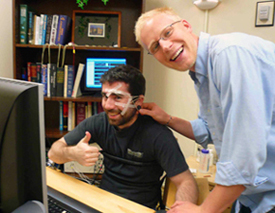 Psychophysiology is a branch of neuroscience that seeks to understand how a person’s mental state and physiological responses interact to affect one another.
Psychophysiology is a branch of neuroscience that seeks to understand how a person’s mental state and physiological responses interact to affect one another.
Modern interest in this area began as far back as the mid-19th century when Phineas Gage, a railway worker, suffered an accidental brain injury that changed his personality and behaviors. The methods employed to determine how such incidents affected human responses, however, could be invasive and sometimes harmful. Eventually, non-invasive approaches developed, and modern practices emerged to study psychophysiological connections between the mind and body.
INFOGRAPHIC: Suprising Alternative Treatments for Mental Disorders
Today, psychophysiologists can use a variety of these non-invasive methods to better understand human behavior and cognition with the goal of improving health.
Psychophysiological Assessments
Psychophysiologists measure physical responses to stimuli by using non-invasive techniques including polygraphs, magnetic resonance imaging or various brain and muscle scans. Participants can be awake during assessments, which may include measuring blood pressure, heart rate, neural activity, reflex time, skin temperature, sexual arousal or startle responses to provide information about how emotion and cognition affect one another. Psychophysiological assessments, such as biofeedback, can also be used to facilitate treatment by helping patients recognize and alleviate symptoms associated with conditions like migraines, chronic pain, attention deficit, neurological impairments or sleep disorders.
Becoming a Practicing Psychophysiologist
Degrees for psychophysiological specialization are offered at bachelor’s, master’s and doctoral levels of study. Graduates with a bachelor’s can start their careers at entry-level positions working in research settings or private practices under supervision. Aspiring psychophysiologists interested in conducting their own research or working with patients directly typically go on to earn master’s or doctoral degrees in keeping with state licensing requirements for practicing psychologists. Accredited programs combine trending theories and state-of-the-art technology in the field with research-based applications. Undergraduate studies prepare students with basic knowledge about cognition, psychological processes, memory, brain disorders, biological technology, neuroanatomy, response patterns and behavior. Graduate and doctoral studies extend these studies to provide future practitioners with practical application skills in areas such as pain and stress management, psychopharmacology and neurofeedback techniques.
Resource: Top 50 Universities to Earn a Psychology Degree
Certifications for Psychophysiologists
In addition to state licensing requirements for practice, psychophysiologists require additional certifications to operate standard tools used in assessments and treatments. These certifications are overseen by organizations such as The Association for the Applied Psychophysiology and Biofeedback or the Biofeedback Certification International Alliance. Master’s and doctoral students usually participate in laboratory training that meets the clock-hour requirements of the certifying agency. A variety of certifications may be obtained including those for general biofeedback, neurofeedback or pelvic muscle dysfunction biofeedback.
The benefits of psychophysiological assessments to treat symptoms of mood or behavioral disorders apply to all populations from young to old. Children with attention deficits can learn cognitive behavioral techniques to control impulsive tendencies. Teens with sleep disorders can benefit from relaxation methods to normalize sleep patterns. Adults can implement practices to alleviate the physical effects of stress and anxiety. In all these ways and more, the field of psychophysiology enhances the lives of people by empowering them with the knowledge to understand and control their mind and body connections.





